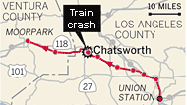Teacher responses to the 2010 release
The following is a list of teacher responses to their "value-added" ratings during the intial release in 2010. See the most recent responses »
The Times gave LAUSD elementary school teachers rated in this database the opportunity to preview their value-added evaluations and publicly respond. Some issues raised by teachers may be addressed in the FAQ. Teachers who have not commented may do so by contacting The Times.
|
|
 Delicious
Delicious
|
 Digg
Digg
|
 Facebook
Facebook
|
 Twitter
Twitter
|





Unfortunately, this rating does not account for the unique situations schools attempt to utilize in assisting student achievement. Noting my own strength in English, a couple of the years represented in this "evaluation" I didn't even teach the math portion of instruction and favored a "team teaching" situation. Therefore, my math score was calculated without me even having taught that subject; my partner teacher taught the math to students on my roster. I now teach only Language Arts at my current school so as to maximize my effectiveness. I'm sorry The Times feels this kind of "evaluation" is necessary. I feel it demeans a profession which is already inadequately compensated financially, consistently regimented and challenged by those who do not practice the profession, and is often thankless.
August 29, 2010 at 8:59 a.m.
I am grateful to work at Montague Charter Academy, a school based on continuous collaboration with teachers, students, faculty, parents, and the entire school community. At our school, we believe in a rigorous and thorough program. Teachers spend countless hours creating effective lessons, and through these important discussions, teachers learn from each other.
August 28, 2010 at 7:45 p.m.
My value-data score change after other teacher complaints that the data was incorrect based upon pool for teacher with 60 or less students it just goes to show you how other teacher's data can effect mine. Not only are scores based upon what my students are doing, but how other teacher's students are doing. Just goes to show you how there are lies, damn lies, and then statistics.
Rene LeClair
August 28, 2010 at 4:14 p.m.
My classes have mainly been ELD, low academic, and behavior problem students, with some grade level students. Generally the high achievers, gifted, and grade level students have been placed in the other class. Administrators have continually thrown behavior plagued students into my class - some years as many as 5 or 6. Many students are transferred at different times in the year because other teachers’ inability to control them, or because the students caused too many problems for them. They test in my class even though they have been there for a partial year. Over the years I have received dozens of students transferred into my class because of behavior problems in another class; I’ve never transferred any student for any reason out of my class. A classroom full of ELD, low academic, and behavior problems offers few role models. In addition, I teach the whole curriculum following district policy - not just teaching to the test or prompting to the test. That includes ELD, language arts, science, social studies, p.e., health, math, and art. Also, there is currently no incentive for the students to perform well on the state tests. Many of the students put little effort into the test.
August 28, 2010 at 1:35 p.m.
I am devastated. My students received a balanced program and I invest much of my time to improving my technique. This doesn't tell the whole story of my classroom and I am sad that this belittles my efforts and the total growth my students experience.
August 28, 2010 at 12:52 p.m.
Even ending up with a overall more effective I question the Times publication of this material. There are many reasons why this database is not right:
1) The students in elementary schools do not have a stake in their test scores. Half the job of getting better test scores is getting students to try their best when the test is not important to them.
2) Students are not assigned randomly and by publishing these scores you are encouraging teachers to do their best to avoid teaching students who have Individual Education Plans for learning disabilities because they will hurt the teacher's scores. These students need the best teachers but this database becomes a major incentive to try and avoid such students. Instead of being rewarded for teaching the most challenging students there is an incentive to not teach these students.
3) I also question the effectiveness of this database when a teacher has to change grades nearly every year. There are many more reasons but I lack space to detail them.
August 28, 2010 at 12:50 p.m.
Even though my rating is acceptable at this point, I find this method of public humiliation quite beneath the integrity of the L.A. Times. What do you hope to accomplish by belittling the accomplishments of so many hard-working, dedicated educators? Before you pass judgement on anyone by labeling them "ineffective" you ought to step into their shoes to personally experience the challenges of a school day, week, month, and year. Then to judge us based on one week's worth of effort by students is incredulous.
When a teacher is "stulled" at our school, the principal does not let the teacher know when they are coming in. They may enter our room any time and stay for as long as they like. The generalizations you make are inaccurate and unfair. We do need to change the way we are evaluated, but your method is far from the right direction.
August 28, 2010 at 12:25 p.m.
I was out of the country this past school year as a Fulbright Teacher, a prestigious program granted to exceptional teachers after a thorough application process. My question is: what data was used to so-called 'rate' me? Additionally, this rating is not a reflection of the scores or the learning of my students. My school (the last year I was there) had an API of 948. My students are high achieving and happy. The ceiling is a lot closer. A random viewer can now look at personal data that inaccurately labels my performance as a teacher and reach the conclusion that I am an 'average' teacher. It is misleading. The public will not necessarily see beyond this. I, personally, am not threatened by this label, but it is simplistic and unfair to so many dedicated and hard-working teachers.
I find this process unhelpful to everyone. How will this improve teaching practices? An education encompasses so much more than a numerical standardized score. Will this benefit anyone? Accountability is crucial in any profession, especially one with such a huge impact on the future of so many, but this is not accountability. This is witch-hunting in the guise of transparency.
August 28, 2010 at 11:21 a.m.
I would like to invite anyone to my classroom to visit me and see me teach. I request students with so called "behavior problems" and emotional issues because I feel they need a teacher that sees them as "the whole child" not just a statistic. I am a teacher because I love children. I only share 163 days of the school year with them and I make them interesting and "effective" for the children, not for statistics. These are children who need to be loved and learn to love learning. That's what I'm there for. Again, please come to my classroom and see for yourself.
August 28, 2010 at 11:20 a.m.
In 2007, I taught 4th grade English-Language Learners (ELLs) on B-track.
After conducting 2 intervention classes (160 hours) and VOLUNTEERING to tutor my students, they gained 50 points ON AVERAGE on the CST in English Language Arts. The average result in math was a 7 point drop. THIS WAS MY FIRST YEAR TEACHING 4th GRADE!
In 2008, I taught 4th grade ELLs on D track. After 120 hours of Intervention and VOLUNTEER tutoring, my students' scores rose 30 points on average on the CST in English Language Arts.
In 2009, I taught 4th grade ELLs on B track. With 80 hours of intervention they gained 20 points on average on the CST in English Language Arts.
I would have accepted a lower ranking in math - that isn't my strength. You need to recheck your data. I have done this data on myself for 3 years.
This does not represent the value added or how hard I worked. I am a Nationally Board Certified teacher, and hold a Reading Certificate.
You claim that this system does not penalize teachers who work with poor students. Your interpretation of my scores makes me think otherwise.
August 28, 2010 at 11:06 a.m.